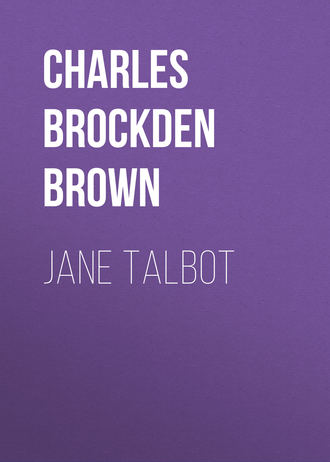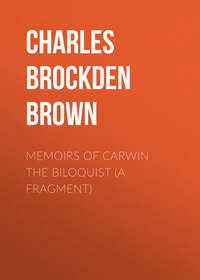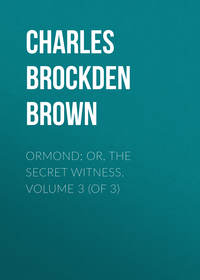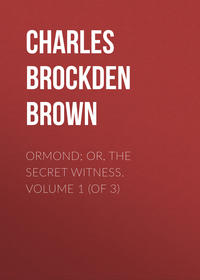 полная версия
полная версияJane Talbot
"Suppose, sir," said I, "what you have already given should prove insufficient. Suppose some new demand should be made upon you."
"I cannot suppose that, after so many solemn and positive assurances."
"But were not assurances as positive and solemn on every former occasion as the last?"
"Why, yes, I must own they were; but new circumstances arose that could not be foreseen?"
"And, dear sir, may not new circumstances arise hereafter that could not be foreseen?"
"Nay, nay," (with some impatience;) "I tell you there cannot be any."
I said no more on this subject at this time; but my father, notwithstanding the confidence he expressed, was far from being at ease.
One day I found him in great perturbation. I met my brother, who was going out as I entered, and suspected the cause of his disquiet. He spoke less than usual, and sighed deeply. I endeavoured, by various means, to prevail on him to communicate his thoughts, and at last succeeded. My brother, it seems, had made a new demand upon his purse, and he had been brought reluctantly to consent to raise the necessary sum by a mortgage on his house, the only real property he possessed. My brother had gone to procure a lender and prepare the deeds.
I was less surprised at this intelligence than grieved. I thought I saw my father's ruin was inevitable, and knew not how to prevent or procrastinate it. After a long pause, I ventured to insinuate that, as the thing was yet to be done, as there was still time for deliberation–
"No, no," interrupted he; "I must go on. It is too late to repent. Unless new funds are supplied, all that we have hitherto done will go for nothing; and Frank assures me that one more sacrifice and all will be well."
"Alas, sir, are you still deceived by that language? Can you still listen to assurances which experience has so often shown to be fallacious? I know nothing of this fine project; but I can see too clearly that unless you hold your hand you will be undone. Would to Heaven you would hesitate a moment!" I said a great deal more to the same purpose, and was at length interrupted by a message from my brother, who desired to see me a few minutes in the parlour below. Though at a loss as to what could occasion such an unusual summons, I hastened down.
I found my brother with a strange mixture of pride, perplexity, and solicitude in his looks. His "how d'ye?" was delivered in a graver tone than common, and he betrayed a disposition to conciliate my good-will, far beyond what I had ever witnessed before. I waited with impatience to hear what he had to communicate.
At last, with many pauses and much hesitation, he said, "Jane, I suppose your legacy is untouched. Was it two or three thousand Mrs. Matthews put you down for in her will?"
"The sum was three thousand dollars. You know that, though it was left entirely at my own disposal, yet the bequest was accompanied with advice to keep it unimpaired till I should want it for my own proper subsistence. On that condition I received, and on that condition shall keep it."
"I am glad of it with all my heart," replied he, with affected vivacity. "I was afraid you had spent it by this time on dolls, trinkets, and baby-things. The sum is entire, you say? In your drawer? I am surprised you could resist the temptation to spend it. I wonder nobody thought of robbing you."
"You cannot suppose, brother, I would keep that sum in my possession? You know it was in bank at my aunt's death, and there it has remained."
"At what bank, pr'ythee?"
I told him.
"Well, I am extremely glad thou hadst wit enough to keep it snug, for now the time has come to put it to some use. My father and I have a scheme on foot by which we shall realize immense profit. The more engines we set to work, the greater and more speedy will be the ultimate advantage. It occurred to me that you had some money, and that, unless it were better employed, it would be but justice to allow you to throw it into stock. If, therefore, you are willing, it shall be done. What say you, Jane?"
This proposal was totally unexpected. I harboured not a moment's doubt as to the conduct it became me to pursue; but how to declare my resolutions, or state my reasons for declining his offer, I knew not.
At last I stammered out that my aunt had bequeathed me this money with views as to the future disposition of it from which I did not think myself at liberty to swerve.
"And pray," said he, with some heat, "what were these profound views?"
"They were simple and obvious views. She knew my sex and education laid me under peculiar difficulties as to subsistence. As affairs then stood, there was little danger of my ever being reduced to want or dependence; but still there was a possibility of this. To insure me against this possible evil, she left me this sum, to be used only for subsistence, and when I should be deprived of all other means."
"Go on," said my brother. "Repeat the clause in which she forbids you, if at any time the opportunity should be offered of doubling or trebling your money and thereby effectually securing that independence which she wished to bequeath to you, to profit by the offer. Pray, repeat that clause."
"Indeed," said I, innocently, "there is no such clause."
"I am glad to hear it. I was afraid that she was silly enough to insert some such prohibition. On the contrary, the scheme I propose to you will merely execute your aunt's great purpose. Instead of forbidding, she would have earnestly exhorted you, had she been a prophetess as well as a saint, to close with such an offer as I now make you, in which, I can assure you, I have your own good as well as my own in view."
Observing my silent and perplexed air, "Why, Jane," said he, "surely you cannot hesitate? What is your objection? Perhaps you are one of those provident animals who look before they leap, and, having gained a monopoly of wisdom, will take no scheme upon trust. You must examine with your own eyes. I will explain the affair to you, if you choose, and convince you beyond controversy that your money may be trebled in a twelvemonth."
"You know, brother, I can be no judge of any scheme that is at all intricate."
"There is no intricacy here. All is perfectly simple and obvious. I can make the case as plain to you, in three minutes, as that you have two thumbs. In the English cottons, in the first place, there is–"
"Nay, brother, it is entirely unnecessary to explain the scheme. My determinations will not be influenced by a statement which no mortal eloquence will make intelligible to me."
"Well, then, you consent to my proposal?"
"I would rather you would look elsewhere for a partner in your undertaking."
"The girl's a fool!–Why, what do you fear? suspect? You surely cannot doubt my being faithful to your interest? You will not insult me so much as to suppose that I would defraud you of your money? If you do,–for I know I do not stand very high in your opinion,–if you doubt my honesty, I will give you the common proofs of having received your money. Nay, so certain am I of success, that I will give you my note, bond, what you please, for thrice the amount, payable in one year."
"My brother's bond will be of no use to me; I shall never go to law with my brother."
"Well, then, what will satisfy you?"
"I am easily satisfied, brother. I am contented with things just as they are. The sum, indeed, is a trifle, but it will answer all my humble purposes."
"Then you will," replied he, struggling with his rage, "you will not agree?"
My silence was an unequivocal answer.
"You turn out to be what I always thought you,–a little, perverse, stupid, obstinate–But take time;" (softening his tone a little;) "take time to consider of it.
"Some unaccountable oddity, some freak, must have taken hold of you just now and turned your wits out of door. 'Tis impossible you should deliberately reject such an offer. Why, girl, three thousand dollars has a great sound, perhaps, to your ears, but you'll find it a most wretched pittance if you should ever be obliged to live upon it. The interest would hardly buy you garters and topknots. You live, at this moment, at the rate of six times the sum. You are now a wretched and precarious dependant on Mrs. Fielder: her marriage (a very likely thing for one of her habits, fortune, and age) will set you afloat in the world; and then where will be your port? Your legacy, in any way you can employ it, will not find you bread. Three times the sum might answer, perhaps; and that, if you will fall on my advice, you may now attain in a single twelvemonth. Consider these things, and I will call on you in the evening for your final answer."
He was going, but I mustered resolution enough to call him back:–"Brother, one word. All deliberation in this case is superfluous. You may think my decision against so plausible a scheme perverse and absurd; but, in this instance, I am fully sensible that I have a right to do as I please, and shall exert that right, whatever censure I may incur."
"So, then, you are determined not to part with your paltry legacy?"
"I am determined not to part with it."
His eyes sparkled with rage, and, stamping on the floor, he exclaimed, "Why, then, let me tell you, miss, you are a damned idiot. I knew you were a fool, but could not believe that your folly would ever carry you to these lengths!"–Much more in this style did poor Frank utter on this occasion. I listened trembling, confounded, vexed, and, as soon as I could recover presence of mind, hastened out of his presence.
This dialogue occupied all my thoughts during that day and the following. I was sitting, next evening, at twilight, pensively, in my own apartment, when, to my infinite surprise, my brother was announced. At parting with him the day before, he swore vehemently that he would never see my face again if he could help it. I supposed this resolution had given way to his anxiety to gain my concurrence with his schemes, and would fain have shunned a second interview. This, however, was impossible. I therefore composed my tremors as well as I was able, and directed him to be admitted. The angry emotions of yesterday had disappeared from his countenance, and he addressed me with his customary carelessness. After a few trifling preliminaries, he asked me if I had considered the subject of our yesterday's conversation. I answered that I had supposed that subject to have been dismissed forever. It was not possible for time or argument to bring us to the same way of thinking on it. I hoped, therefore, that he would not compel me to discuss it a second time.
Instead of flying into rage, as I expected, he fixed his eyes thoughtfully on the floor, and, after a melancholy pause, said, "I expected to find you invincible on that head. To say truth, I came not to discuss that subject with you anew. I came merely to ask a trifling favour." Here he stopped. He was evidently at a loss how to proceed. His features became more grave, and he actually sighed.
My heart, I believe thou knowest, Harry, is the sport, the mere plaything, of gratitude and pity. Kindness will melt my firmest resolutions in a moment. Entreaty will lead me to the world's end. Gentle accents, mournful looks, in my brother, was a claim altogether irresistible. The mildness, the condescension which I now witnessed thrilled to my heart. A grateful tear rushed to my eye, and I almost articulated, "Dear, dear brother, be always thus kind and thus good, and I will lay down my life for you."
It was well for us both that my brother had too much pride or too little cunning to profit by the peculiarities of my temper. Had he put a brotherly arm around me, and said, in an affectionate tone, "Dear sister, oblige me," I am afraid I should have instantly complied with the most indiscreet and extravagant of his requests.
Far otherwise, however, was his deportment. This condescension was momentary. The words had scarcely escaped him before he seemed to recollect them as having been unworthy of his dignity. He resumed his arrogant and careless air, half whistled "ça ira," and glanced at the garden, with, "A tall poplar that. How old?"
"Not very old, for I planted it."
"Very likely. Just such another giddy head and slender body as the planter's. But, now I think of it, Jane, since your money is idle, suppose you lend me five hundred dollars of it till to-morrow. Upon my honour, I'll repay it then. My calls just now are particularly urgent. See here; I have brought a check ready filled. It only wants your signature."
I felt instant and invincible repugnance to this request. I had so long regarded my brother as void of all discretion, and as habitually misapplying money to vicious purposes, that I deemed it a crime of no inconsiderable degree to supply the means of his prodigality. Occasions were daily occurring in which much good was effected by a few dollars, as well as much evil produced by the want of them. My imagination pondered on the evils of poverty much oftener than perhaps was useful, and had thence contracted a terror–of it not easily controlled. My legacy I had always regarded as a sacred deposit,–an asylum in distress which nothing but the most egregious folly would rob or dissipate. Yet now I was called upon to transfer, by one stroke of the pen, to one who appeared to me to be engaged in ruinous vices or chimerical projects, so large a portion as five hundred dollars.
I was no niggardly hoarder of the allowance made me by my mother; but so diffident was I of my own discernment, that I never laid out twenty dollars without her knowledge and concurrence. Could I then give away five hundred of this sacred treasure, bestowed on me for very different purposes, without her knowledge? It was useless to acquaint her with my brother's request and solicit her permission. She would never grant it.
My brother, observing me hesitate, said, "Come, Jane; make haste. Surely this is no such mighty favour, that you should stand a moment. 'Twill be all the same to you, since I return it to-morrow. May I perish if I don't!"
I still declined the offered pen:–"For what purpose, brother, surely I may ask?–so large a sum?"
He laughed:–"A mere trifle, girl;'tis a bare nothing. But, much or little, you shall have it again, I tell you, to-morrow. Come; time flies. Take the pen, I say, and make no more words about the matter."
"Impossible, till I know the purpose. Do not urge me to a wrong thing."
His face reddened with indignation. "A wrong thing! you are fool enough to tire the patience of a saint. What do I ask, but the loan of a few dollars for a single day? Money that is absolutely idle; for which you have no use. You know that my father's property is mine, and that my possessions are twenty times greater than your own; yet you refuse to lend this paltry sum for one day. Come, Jane, sister; you have carried your infatuation far enough. Where a raw girl should gain all these scruples and punctilios I can't imagine. Pray, what is your objection?"
In these contests with my brother, I was never mistress of my thoughts. His boisterous, negligent, contemptuous manners awed, irritated, embarrassed me. To say any thing which implied censure of his morals or his prudence would be only raising a storm which my womanish spirit could not withstand. In answer to his expostulations, I only repeated, "Impossible! I cannot."
Finding me inflexible, he once more gave way to indignation:–"What a damned oaf! to be thus creeping and cringing to an idiot–a child–an ape! Nothing but necessity, cruel necessity, would have put me on this task." Then turning to me, he said, in a tone half supplicating, half threatening, "Let me ask you once more: will you sign this check? Do not answer hastily; for much, very much, depends on it. By all that is sacred, I will return it to you to-morrow. Do it, and save me and your father from infamy; from ruin; from a prison; from death. He may have cowardice enough to live and endure his infamy, but I have spirit enough to die and escape it."
This was uttered with an impetuosity that startled me. The words ruin, prison, death, rung in my ears, and, almost out of breath, I exclaimed, "What do you mean? my father go to prison? my father ruined? What do you mean?"
"I mean what I say. Your signing this check may save me from irretrievable ruin. This trifling supply, which I can nowhere else procure, if it comes to-night, may place us out of danger. If delayed till to-morrow morning, there will be no remedy. I shall receive an adequate sum to-morrow afternoon, and with that I will replace this."
"My father ruined! In danger of a jail! Good Heaven! Let me fly to him. Let me know from himself the full extent of the evil." I left my seat with this purpose, but he stopped me:–"Are you mad, girl? He does not know the full extent of the evil. Indeed, the evil will be perfectly removed by this trifling loan. He need not know it." "Ah! my poor father," said I, "I see thy ruin indeed. Too fatally secure hast thou been; too doting in thy confidence in others." These words, half articulated, did not escape my brother. He was at once astonished and enraged by them, and even in these circumstances could not suppress his resentment.
He had, however, conjured up a spirit in me which made me deaf to his invective. I made towards the door.
"Where are you going? You shall not leave the room till you have signed this paper."
'"Nothing but force shall keep me from my father. I will know his true situation this instant, from his own lips. Let me go. I will go."
I attempted to rush by him, but he shut the door and swore I should not leave the room till I had complied with his request.
Perceiving me thoroughly in earnest, and indignant in my turn at his treatment, he attempted to soothe me, by saying that I had misunderstood him in relation to my father; that he had uttered words at random; that he was really out of cash at this moment; I should inexpressibly oblige him by lending him this trifling sum till to-morrow evening.
"Brother, I will deal candidly with you. You think me childish, ignorant, and giddy. Perhaps I am so; but I have sense enough to resolve, and firmness enough to adhere to my resolution, never to give money without thoroughly knowing and fully approving of the purposes to which it is to be applied. You tell me you are in extreme want of an immediate supply. Of what nature is your necessity? What has occasioned your necessity? I will not withhold what will really do you good,–what I am thoroughly convinced will do you good; but I must first be convinced."
"What would you have more than my word? I tell you it will save your-I tell you it will serve me essentially. It is surely needless to enter into long and intricate details, which, ten to one, you will not understand."
"As you please," said L "I have told you that I will not act in the dark."
"Well, then, I will explain my situation to you as clearly as possible."
He then proceeded to state transactions of which I understood nothing. All was specious and plausible; but I easily perceived the advantages under which he spoke, and the gross folly of suffering my conduct to be influenced by representations of whose integrity I had no means of judging.
I will not detain you longer by this conversation. Suffice it to say, that I positively refused to comply with his wishes. The altercation that ensued was fortunately interrupted by the entrance of two or three visitants, and, after lingering a few minutes, he left the house gloomy and dissatisfied.
I have gone into these incidents with a minuteness that I fear has tired you; but I will be more concise for the future. These incidents are chiefly introductory to others of a more affecting nature, and to those I must now hasten. Meanwhile, I will give some little respite to my fingers.
Letter VI
[Editorial note: The observant reader will have noted there is no Letter V. The original text did not contain one, and we have chosen to let the letters retain their original numbers, rather than renumber them.]
To Henry ColdenThursday Morning, October 6.
As soon as my visitants had gone, I hastened to my father. I immediately introduced the subject of which my heart was full. I related the particulars of my late interview with my brother; entreated him with the utmost earnestness to make the proper inquiries into the state of my brother's affairs, with whose fate it was too plain that his own were inextricably involved.
He was seized with extreme solicitude on hearing my intelligence. He could not keep his chair one moment at a time, but walked about the floor trembling. He called his servant, and directed him, in a faltering voice, to go to my brother's house and request him to come immediately.
I was sensible that what I had done was violently adverse to my brother's wishes. Nevertheless, I urged my father to an immediate explanation, and determined to be present at the conference.
The messenger returned. My brother was not at home. We waited a little while, and then despatched the messenger again, with directions to wait till his return. We waited, in vain, till nine; ten; eleven o'clock. The messenger then came back, informing us that Prank was still abroad. I was obliged to dismiss the hope of a conference this night, and returned in an anxious and melancholy mood to Mrs. Fielder's.
On my way, while ruminating on these events, I began to fear that I had exerted an unjustifiable degree of caution. I knew that those who embark in pecuniary schemes are often reduced to temporary straits and difficulties; that ruin and prosperity frequently hang on the decision of the moment; that a gap may be filled up by a small effort seasonably made, which, if neglected, rapidly widens and irrevocably swallows up the ill-fated adventurer.
It was possible that all my brother had said was literally true; that he merited my confidence in this instance, and that the supply he demanded would save both him and my father from the ruin that impended over them. The more I pondered on the subject, the more dissatisfied I became with my own scruples. In this state of mind I reached home. The servant, while opening the door, expressed her surprise at my staying out so late, telling me that my brother had been waiting my return for several hours, with marks of the utmost impatience. I shuddered at this intelligence, though just before I had almost formed the resolution of going to his house and offering him the money he wanted.
I found him in my apartment. "Good God!" cried he; "where have you been till this time of night?"
I told him frankly where I had been, and what had detained me. He was thunder-struck. Instead of that storm of rage and invective which I expected, he grew pale with consternation, and said, in a faint voice,–
"Jane, you have ruined me beyond redemption. Fatal, fatal rashness! It was enough to have refused me a loan which, though useless to you, is as indispensable to my existence as my heart's blood. Had you quietly lent me the trifling pittance I asked, all might yet have been well,–my father's peace have been saved and my own affairs been completely re-established."
All arrogance and indignation were now laid aside. His tone and looks betokened the deepest distress. All the firmness, reluctance, and wariness of my temper vanished in a moment. My heart was seized with an agony of compunction. I came close to him, and, taking his hand involuntarily, said, "Dear brother, forgive me."
Strange what influence calamity possesses in softening the character! He made no answer, but, putting his arms around me, pressed me to his breast, while tears stole down his cheek.
Now was I thoroughly subdued. I am quite an April girl, thou knowest, Harry, and the most opposite emotions fill, with equal certainty, my eyes. I could scarcely articulate, "Oh, my dear brother, forgive me. Take what you ask. If it can be of any service to you, take all I have."
"But how shall I see my father? Infinite pains have I taken to conceal from him a storm which I thought could be easily averted, which his knowledge of it would only render more difficult to resist; but my cursed folly, by saying more than I intended to you, has blasted my designs."
I again expressed my regret for the rashness of my conduct, and entreated him to think better of my father than to imagine him invincible to argument. I promised to go to him in the morning, and counteract, as much as I could, the effects of my evening conversation. At length he departed, with somewhat renovated spirits, and left me to muse upon the strange events of this day.







